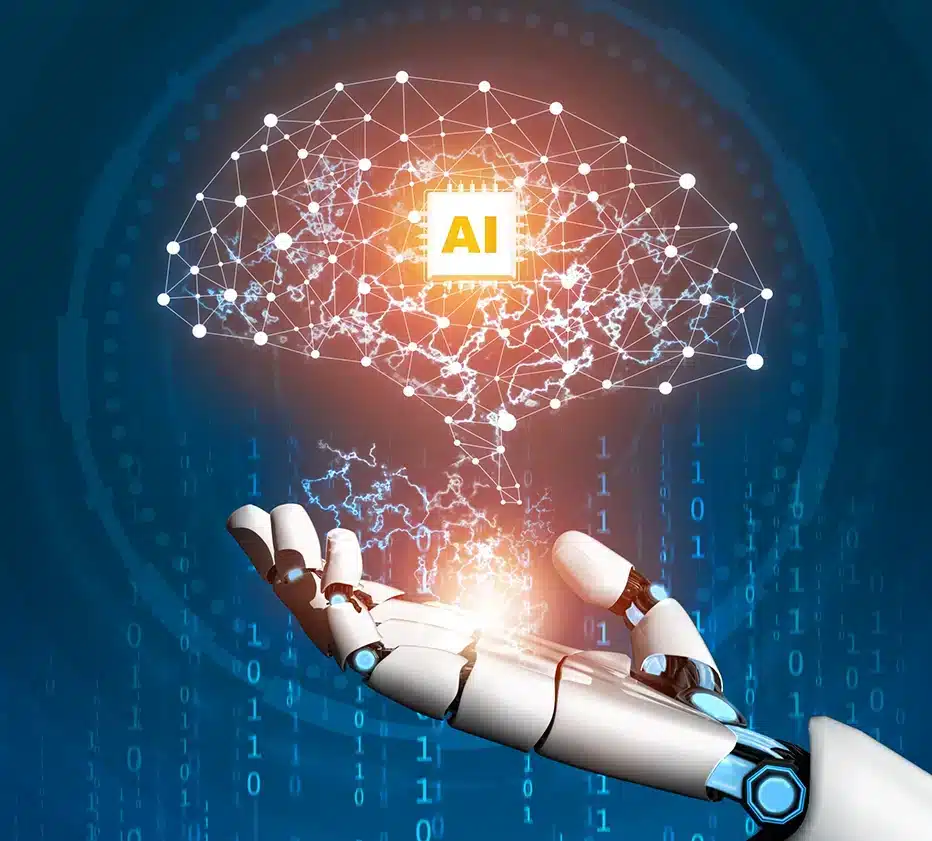Despite being around since the 1950s, artificial intelligence has seen a sharp increase in popularity in recent years. In the next eight years, the future of the Artificial Intelligence industry is expected to expand by over 13 times, according to a study by Exploding Topics. Almost every sector, from academia to healthcare, has benefited greatly from AI business solutions. Businesses may now produce better results more quickly thanks to AI services.
A cutting-edge field of computer science and engineering called artificial intelligence is devoted to the development of intelligent, self-aware agents. How to build machines that are capable of intelligent behavior is a topic of AI study.
Applications developed by AI developers can be used in a variety of ways in practice, such as:
1. Machine Learning:
Computers may be taught to learn from data without being explicitly programmed using a technique called machine learning.
2. Natural Language Processing:
This entails teaching computers how to comprehend spoken language and react in a manner that is akin to how people would naturally do so.
3. Robotics:
This entails using robots to complete tasks that would be challenging or impossible for humans to complete.
4. Predictive analytics:
It is a technique that employs artificial intelligence to forecast upcoming occurrences, trends, and behaviors.
According to a number of artificial intelligence researchers, humanity’s future in every sector will soon be shaped by AI.
How will AI Change the Future?
Here are some ways that artificial intelligence will alter the future, according to recent technological developments in the field:
Food technology:
Without a question, AI solutions are drastically changing the field of food technology. Artificial Intelligence is being used to streamline and optimize food production, delivery, and consumption, from automated restaurants to farm management. Here are a few instances of AI uses in food technology:
Automated dining establishments :
AI is being utilized to develop fully automated dining establishments, where patrons may place orders and make payments for their meals without speaking to a single human. The truth is that automated restaurants are already appearing all over the world, despite the fact that to some this may sound like a dystopian nightmare.
Farm Management :
AI is also utilized to assist farmers in the more efficient management of their livestock and crops. AI can assist farmers in optimizing everything from irrigation to agricultural yields by using sensors and data analysis.
Meals Delivery :
AI is also having a significant impact on the delivery of food. AI is being used by businesses like DoorDash and Postmates to route drivers and improves delivery times. Self-driving delivery vehicles are also a possibility, which would further minimize the demand for human labor in the food delivery process.
Nutrition :
AI is being used to assist people in choosing healthier diets. AI is used by apps like Calorie and Fooducate to track users’ eating patterns and recommend healthier substitutions.
Food wasting :
AI is being used in the fight against food waste. AI is being used by startups like ReFED to track food waste along the supply chain and create strategies for decreasing it.
Banking sector:
Artificial intelligence is one field that banks are turning to in order to stay on top of the game (AI). There are many ways AI may be applied to enhance customer satisfaction, boost productivity, and lower risk. Here are some instances of the application of AI in the banking and financial services sector:
Automated customer service :
Artificial Intelligence can be used to automate customer support tasks like responding to FAQS and handling straightforward client inquiries. Customers will have a more productive experience as a result of giving customer support agents more time to solve more complicated problems.
Real-time detection :
AI assists in the real-time detection of fraudulent conduct. AI can detect odd activity that might be a sign of fraud by tracking consumer behavior and transactions. This aids banks in loss mitigation and customer safety.
Loan Approval :
The procedure of loan approval is streamlined using AI. Artificial intelligence (AI) can assist banks in more swiftly determining whether to approve a loan application by leveraging information from social media, credit reports, and other sources.
Personalized Recommendations :
Recommendations are specifically tailored to each customer’s requirements and preferences can be given to them using AI. For instance, a credit card with no international transaction fees would be suggested to a client who frequently travels for business. Another option is to offer a customer who is attempting to save for a down payment on a home a savings account with a higher interest rate.
Financial Planning :
AI can be used to assist clients in making financial plans and achieving their goals. AI may offer tailored advice on how to invest, save money, and more by taking into consideration a customer’s income, expenses, and financial goals.
Academics :
The development of artificial intelligence has opened up possibilities for using adaptive technology to improve academic achievement. Artificial Intelligence can provide more individualized and efficient training by developing intelligent tutoring systems that can adjust to the specific demands of a student. Digital assistants that may assist with duties like scheduling, research, and giving feedback on projects can also be made using AI. The potential for AI technology to have an impact on academia will only increase as it develops.
Logistics and Transportation :
One of the most promising fields for the application of artificial intelligence (AI) is the logistics and transportation sector. There are several advantages to implementing AI in logistics and transportation, and the sector has already had some early successes.
Automating tedious and time-consuming processes is one of the main benefits of AI in logistics. Artificial Intelligence can be used, for example, to automatically track and update shipment statuses, keep track of arrival times, and reroute goods in the event of delays. This not only helps to ensure that shipments arrive on schedule and without any problems, but it also saves logistics managers time and effort.
Artificial Intelligence can also be applied in the logistics and transportation sector to enhance customer service. For example, AI-driven chatbots can be used to respond to consumer questions and deliver real-time updates on shipping status. AI can also be used to proactively identify and fix shipping issues before they put customers at risk.
A software development company can employ AI to create fresh, cutting-edge solutions for the logistics and transportation sector in addition to automating and optimizing current procedures. AI, for instance, can be utilized to streamline freight operations and create better route-planning algorithms. AI can be utilized to create new vehicle classes, such as self-driving cars, which will increase the effectiveness of the transportation industry.
Digital marketing:
One of the most crucial facets of business in the contemporary world is digital marketing. Success requires the capacity to relate to clients and build relationships. Digital marketing requires consideration of social media, website design, and SEO. The most crucial instrument in the field of digital marketing, however, is swiftly evolving to be artificial intelligence.
AI can be applied to digital marketing in a variety of ways. In terms of client relationship management, it is one of the most crucial. Businesses can employ AI to help them comprehend their customers more fully. The creation of more specialized content and experiences can be done using this knowledge. Tasks related to customer service can also be automated using AI. As a result, firms may have more time to concentrate on other aspects of their operations.
Data analysis is a crucial area in which AI may be employed in digital marketing. Businesses produce a large amount of data. Better marketing efforts can be made using this data. Businesses can use AI to sort through this data and locate the most crucial information. The creation of more focused and successful campaigns may then be done using this information.






